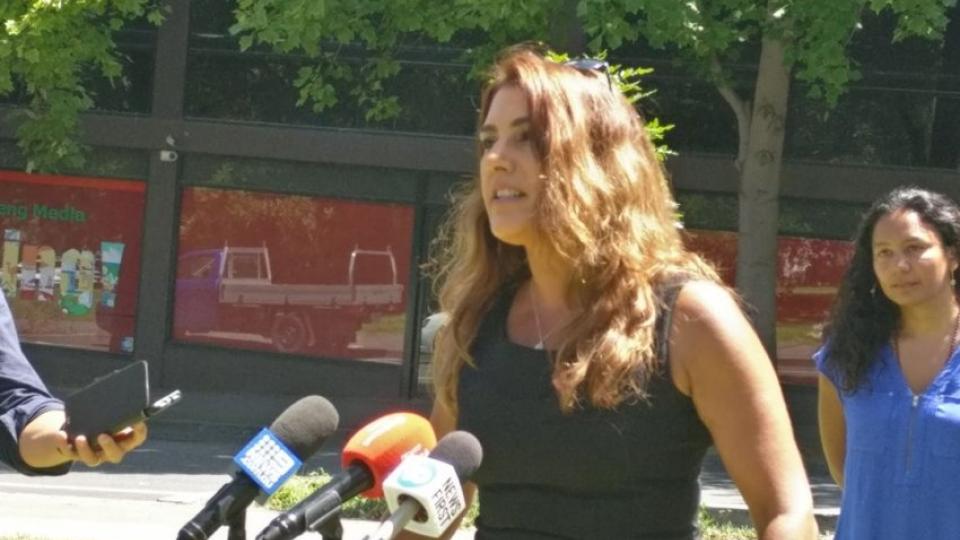End the scapegoating of Djab Wurrung Gunnai Gunditjmara woman Senator Lidia Thorpe

What utter hypocrisy!
The ferocious attack on DjabWurrung Gunnai Gunditjmara woman and Greens Senator Lidia Thorpe is not because she has a “conflict of interest”. It is because she is a militant First Nations woman.
Thorpe is being targeted because she has not tamely gone along with the undemocratic ways in which capitalist parliaments function.
She has tried to find ways to challenge colonisation, despite being elected to a capitalist parliament — an institution which pretends to be democratic. She spoke the truth about colonisation, including the monarchy.
She insisted that any “Voice” worth having a referendum on has to include a process of truth-telling about the violence towards First Nations communities that started with colonisation and which continues today, with high rates of imprisonment, deaths in custody, removal of children from their families, and the destruction of land, water and sacred sites.
Her push for a “Truth and Treaty process”, rather than just “Voice” has drawn a concerted push-back from the powers-that-be.
But rather than debate the politics of her proposal, the establishment media and Thorpe’s political opponents have been trawling through her personal life to find anything to discredit her.
The fact that she has been attacked by other First Nations politicians should not be surprising. Like all communities, First Nations communities include a range of political opinions. Often they are rooted in class differences.
Thorpe is staunch in her representation of grassroots communities: she is under attack because of her militancy.
Some Greens also appear to be undermining Thorpe. The Greens have their differences: some support a mainstream approach to politics, or a little to the left of Labor, while others want a more radical, albeit parliamentarist, party.
Thorpe does not fit in either of these camps.
Another troubling element is that Thorpe’s attackers are trying to delegitimise anyone taking up the democratic rights questions around ex-bikies, bikie gangs, deportations of Aboriginal people to other countries and deportations of people who have committed a crime and served out their prison sentence.
Members of motorcycle gangs who commit crime do need to face justice. But the anti-association laws have penalised many who do not have links to organised crime. And not all motor bike clubs are involved in organised crime.
Fundamentally, these are democratic rights issues. Why shouldn’t you be able to be friends with an ex-bikie, especially one who has no criminal past? Why can’t an ex-bikie, or even someone who has served time, leave their past behind?
Isn’t our prison and criminal (in)justice system meant to be based on rehabilitation?
And why can’t Thorpe, or anyone else, speak out against deportations of First Nations people? Why can’t anyone speak out against deportations of people who have done a crime and served their time?
The laws against associating with bikies have meant that police have unjustly targeted people. They have includes those simply eating ice cream together, those in tattoo parlours, those who love group motor bikes rides and those how have had fleeting contact with an ex-bikie or a current bikie.
I have met some of the families of men locked in the Melbourne Immigration Transit Accommodation detention centre, in Broadmeadows, who are awaiting deportation after serving their sentence.
One fighting deportation has lived in Australia since he was a child. He has 11 kids, all residing here. One of his children is buried in the Fawkner Cemetery. He has grandchildren here. He should be released into the community to be with his family because he has served his time.
The photo accompanying this article is of Thorpe speaking at a protest outside the Park Hotel in Melbourne. She called for the imprisoned refugees, who had been transported from Nauru and Manus to Australia for medical treatment, to be freed.
Instead of being given treatment, the asylum seekers were locked up in hotel rooms.
What makes Thorpe different to other politicians, including some in the Greens, is her commitment to causes. She does not just turn up to rallies to speak, and get a photo.
Thorpe knows a number of refugees personally, and has been taking up their cases. She has also taken up cases of First Nations men who have faced 501 deportation notices.
I to take conflicts of interest seriously; they should be declared. Thorpe made a mistake and has apologised.
But she is not being hounded for this, she is being hounded because she is a militant First Nations woman who has not been tamed by parliament.
No doubt Thorpe has made mistakes. We all have. As long-time Builders Labourers Federation and later Construction, Forestry, Mining and Energy Union leader John Cummins used to say (and I’m paraphrasing) if you have never made any mistakes, you have never been involved in any struggles for workers’ rights.
[Sue Bolton is a Socialist Alliance Merri-bek councillor.]